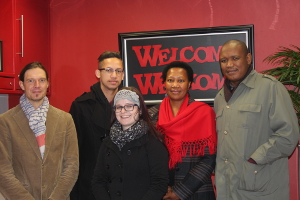Latest News Archive
Please select Category, Year, and then Month to display items
02 January 2025
|
Story Gerda-Marie van Rooyen
|
Photo Supplied
 Leading the research in South Africa is Prof Linus Franke from the Department of Soil, Crop and Climate Sciences.
Leading the research in South Africa is Prof Linus Franke from the Department of Soil, Crop and Climate Sciences.
Scientists are actively pursuing the successful breeding of diploid hybrid potatoes from inbred lines. This is expected to revolutionise potato breeding as it holds the key to rapid genetic progress. It will introduce new varieties for commercialisation through seed. Currently, existing potato variants have a gene that renders self-pollinated seeds infertile.
Prof Linus Franke, an academic in the Department of Soil, Crop and Climate Sciences at the UFS, is leading the research in South Africa. “This technology allows the production of genetically uniform potato seed that is easy to transport and largely disease-free.” He says this differs from conventional breeding whereby only vegetative propagation is possible due to tetraploid varieties in potatoes. It also risks carrying pests and diseases from one generation to the next – leading to the accumulation of pests and diseases with each round of multiplication.
Seed innovation
Prof Franke explains that Solynta BV, a seed company based in the Netherlands that produces potato varieties that can be grown from seed, has included South Africa in their research efforts because it is one of Africa’s largest producers and exporters. Through his academic relationship with Wageningen University and Research, a Dutch institution renowned for its agricultural endeavours and food production, the UFS became involved in researching hybrid potatoes grown from seed.
Diploid seeds containing two sets of chromosomes allow easier gene manipulation to increase predictability and speedier genetic progress. The breeding approach enables the incorporation of tolerance to pests, diseases, abiotic stresses (cold, heat, drought) and other desired genetic traits.
Although Prof Franke is optimistic about this research, he is not blind to disadvantages. “Potato seeds are tiny and have little energy reserves, making it harder to grow potatoes from seed than from tubers.” He says potatoes from seed will take longer to cultivate than tubers, as farmers need to grow plantlets from seeds first, adding six weeks to the growing period. “It is possible that commercial farmers can grow potatoes directly from seed. Alternatively, perhaps more likely, specialised growers will produce tubers of potatoes from seed; these tubers are then sold as seed tubers to other potato farmers, who then continue their normal practices of producing potatoes for the market from tubers.”
Financial benefits
Prof Franke says farmers have reason to get excited. “Seed potatoes will reduce input costs, as varieties with enhanced tolerance to pests and diseases require less pesticides. Planting one hectare of potatoes requires three to four tonnes of potato tubers, but only one 25 g packet of potato seeds.” Since potatoes are a more valuable commodity than maize, this technology might also increase farmers’ income potential.
2015 Erasmus Mundus Grantees announced
2015-07-07

Front row, from the left: Frans Kruger, Lecturer: School of Education Studies; Trudie Strauss, Lecturer, Mathematical Statistics and Actuarial Science
Back row, from the left: Johnathan Adams, Teaching Assistant: Centre for Teaching and Learning; Moliehi Rosemary Mpeli, Lecturer: School of Nursing; Ncedo Xhala, Research Assistant: Quantity Surveying and Construction Management.
Photo: Mamosa Makaya |
The grantees of the 2015 Erasmus Mundus programme have been announced, and will soon head off to various institutions at European universities to embark on academic and professional exchange programmes. The cohort is made up of some of the best, most talented staff of the university, who are currently studying towards master’s and PhD programmes in fields such as Mathematics and Actuarial Sciences, Quantity Surveying, Bioethics, and Education.
The Erasmus Mundus programme is an international partnership that enhances academic cooperation between institutions of higher education in South Africa and the European Union, and has within it the EUROSA, EU Saturn and INSPIRE programmes. It aims to promote inter-cultural understanding, and the development of both European and Third-Country universities. The UFS has participated in the programme since 2010. In 2014, 13 staff members were granted PhD and master’s study programmes for a period of up to 22 months in various fields such as Communication Science, Urban and Regional Planning and Law, at among others, the Universities of Ghent, Antwerp Tilburg and Uppsala.